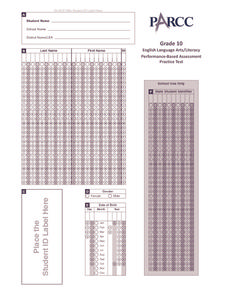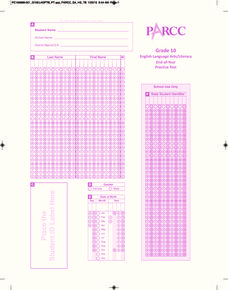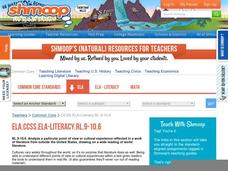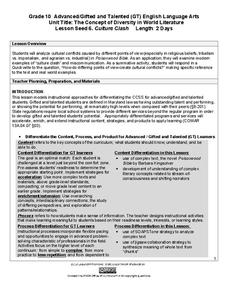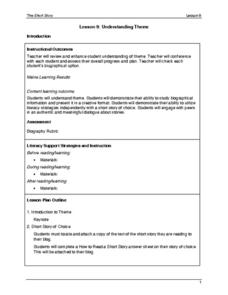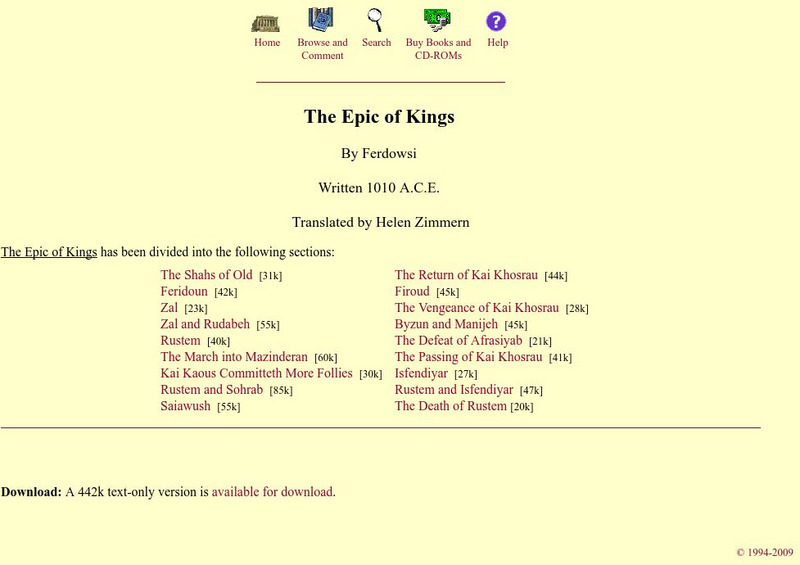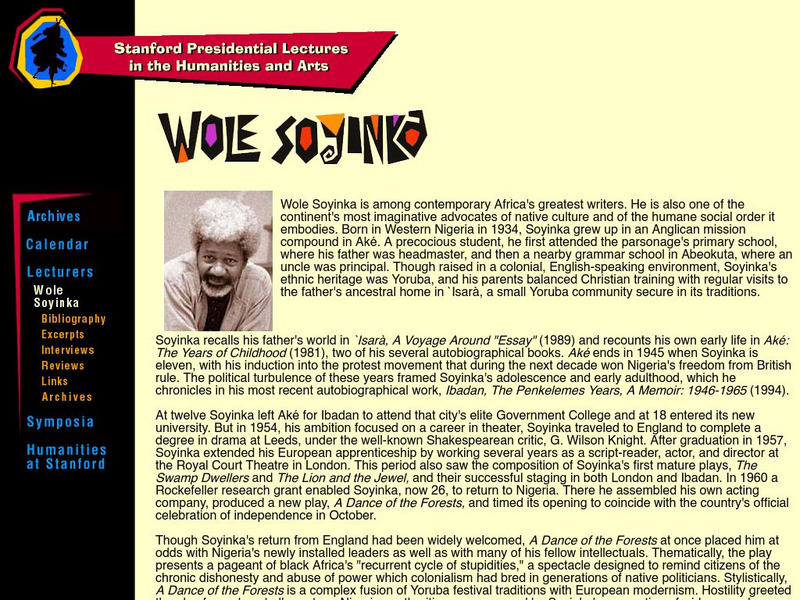Maryland Department of Education
The Concept of Diversity in World Literature Lesson 10: Author's Purpose Seminar
Why did Chinua Achebe write "An Image of Africa: Racism in Conrad's Heart of Darkness" in response to Conrad's novel? As part of a study of Things Fall Apart, class members conduct a socratic seminar focused on Achebe's purpose and...
Maryland Department of Education
The Concept of Diversity in World Literature Lesson 9: Debating Imperialism
To gain an understanding of Imperialism, class members read Rudyard Kipling's poem, "The White Man's Burden" and Mark Twain's essay, "To the Person Sitting in Darkness." Groups compare these perceptions of non-white cultures with the...
Maryland Department of Education
The Concept of Diversity in World Literature Lesson 8: Nonfiction Close Reading
As part of their study of Things Fall Apart, class members conduct a close reading of a section of Chinua Achebe's essay, "An Image of Africa: Racism in Conrad's Heart of Darkness." Jigsaw groups then compare the voice in the essay...
Maryland Department of Education
The Concept of Diversity in World Literature Lesson 4: Proverbs
"Eneke the bird says since men have learnt to shoot without missing, he has learnt to fly without perching." As part of their study of Things Fall Apart, class members read Paul Hernadi and Francis Steen's essay, "The Tropical Landscapes...
Maryland Department of Education
The Concept of Diversity in World Literature Lesson 1: Unit Introduction
To launch a unit study of the concept of diversity in World Literature, class members compare Chinua Achebe's essay, "An Image of Africa: Racism in Conrad's Heart of Darkness" and Richard Rodriguez's essay, "The Chinese in All of Us: A...
K12 Reader
Narrator’s Point of View Flow Chart
How can you tell what point of view a narrator is using, and why does it matter when reading or writing? Use a handy flow chart to determine whether or not your narrator is telling the story from a first or third person point of view.
Curated OER
Performance-Based Assessment Practice Test (Grade 10 ELA/Literacy)
Get an idea of how your class members might perform on the Common Core tests with a comprehensive practice test. The assessment includes literary and informational passages for learners to read an analyze. Pupils respond to a series of...
Curated OER
End-of-Year Practice Test (Grade 10 ELA/Literacy)
Common Core testing is approaching, so why not provide your pupils with appropriate practice? This practice assessment includes both literary and informational passages for class members to examine and answer questions about. Also...
Curated OER
End-of-Year Practice Test (Grade 9 ELA/Literacy)
What better way to prepare your class for Common Core testing than with a practice test? The practice test includes several reading passages, both literary and informational, and learners respond to multiple choice questions about these...
K12 Reader
Different Perspectives: The American Revolution
Prompt your young historians to hone in their reading comprehension skills by considering the fascinating perspective that Rudyard Kipling offers in his poem, "The American Rebellion", which provides an alternative perspective toward the...
National Endowment for the Arts
Teacher's Guide: The Great Gatsby by F. Scott Fitzgerald
A 10-lesson unit takes high schoolers through a novel study of F. Scott Fitzgerald's The Great Gatsby. To start, students learn about Fitzgerald's background and gain historical context that prepares them for a reading of the book. The...
Polk Bros Foundation
Common Core Constructed Response Organizer
Get your writers ready to compose a constructed response essay in response to either an informational or fictional text. Pupils note down the big idea they wish to address as well as up to nine examples from the text that they wish to...
Curated OER
Sample Lesson 1: Is This Source Credible? Useful? Why and Why Not?
Build background knowledge for The Book Thief by Markus Zusak while teaching your pupils how to determine the credibility of online sources. The plan is designed to take place over the course of two days. On the first day, model how to...
Shmoop
ELA.CCSS.ELA-Literacy.RL.9-10.6
Being able to identify and understand the point of view of fictional characters across a wide range of time periods, places, and cultures is a skill that is necessary for becoming a proficient reader. It is also a skill identified in the...
Japan Society
Akutagawa Ryunosuke and the Taisho Modernists
Japan's Taisho Period was a time when authors like Akutagawa and other Japanese modernists began to experiment with point of view and literary form, making the literature produced during this time period a natural choice for teaching...
Japan Society
Changing Times, Changing Styles: New Japanese Literary Styles of the Late Nineteenth Century
Focusing on Doppo's "Unforgettable People" and late nineteenth century Japanese literature, this resource also leads to discussions of form being dictated by content. Explore the development of new literary styles first-hand by...
Curated OER
Exploring Contrasts in "The Lanyard" by Billy Collins
Middle schoolers analyze the speaker's ideas and tone in the Billy Collins poem "The Lanyard." After identifying how each of the five senses is addressed in the poem, they compare images to draw conclusions about the speaker and his...
Maryland Department of Education
The Concept of Diversity in World Literature Lesson 6: Culture Clash
To prepare for a Quickwrite on the question, "How do different points of view create cultural conflicts?" class groups draw examples of religious, cultural, and political conflicts from Things Fall Apart and The Poisonwood Bible to use...
Maine Content Literacy Project
Understanding Theme
The ninth in a fourteen-lesson series, this plan marks a sort of midpoint in a unit devoted to the study of short stories. Pupils learn about theme and work on their short story projects by adding to their blogs, checking in with the...
British Library
British Library: Explore the World's Knowledge
The United Kingdom's British Library is the largest library in the world. It's collections include cultural artifacts from around the world on topics such as art, music and literature. Explore virtual reproductions of classic works of...
Massachusetts Institute of Technology
Mit: Internet Classics Archive: The Epic of Kings
A modern prose English translation of the 11th century Persian poem, "The Epic of Kings," or "Shahnameh," by Ferdowsi. This translation is by Helen Zimmern. This translation is divided into 18 sections.
National Endowment for the Humanities
Neh: Edsit Ement: Chinua Achebe's Things Fall Apart
Three detailed lesson plans for high school students studying Chinua Achebe's novel "Things Fall Apart." Provides plenty of resources, such as links, lesson extensions, and more.
National Humanities Center
National Humanities Center: Teacher Serve: The Trickster in African American Literature
Trudier Harris, Professor of English at the University of North Carolina at Chapel Hill, explains the role of tricksters in African American literature.
Stanford University
Stanford University/wole Soyinka
This biography of Wole Soyinka includes links to interview excerpts, reviews on his books and excerpts from his works.








